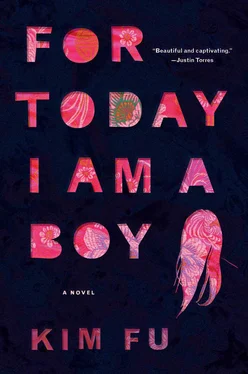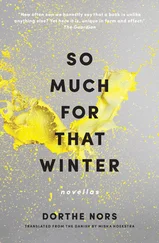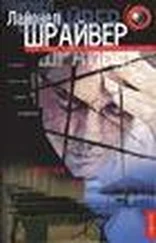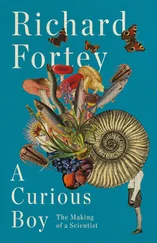“This job doesn’t mean much to you now because you’re a kid, and I feed you and clothe you and put a roof over your head. When you have a wife and kids, you won’t be able to laze around in bed whenever you feel like it. They’ll all starve.” His shadow stayed the same: a defined head and shoulders, everything lost to darkness below. My father did not gesture with his hands.
He left the room. I got up about half an hour later. I leaned on the wall as I dialed. I told the waitress that I felt better and was coming in for my shift after all.
That night, the surgical lights and gleaming surfaces assaulted my senses. Sweat soaked through my shirt and my jacket, poured down my face and back. The sound of the dishes clicking against each other, of a knife’s shink against the sharpening steel, embedded itself in my forehead like shrapnel. I could imagine reaching up and digging the shards of noise out of my skin.
Chef kept looking at me. He didn’t ask if I wanted to go home. He came by once with a bottle of water from the bar cooler and pressed it to the back of my neck. My spine arched like a stroked cat’s. The cold came in a rising wave, engulfing, a strange, fevered ecstasy. He held it there for a solid minute, and then left it on my station for me to drink.
A few weeks into my routine with Ollie, I started to notice a change in my legs. It was most noticeable in the backs of my thighs, where rounded muscle had grown. There’d been nothing there before.
Ollie and I talked a lot about Montreal, spinning fantasies. We’d work in the day, party at night, sleep on his brother’s floor, drown in money and freedom. Learn French. Take up smoking. Take up cocaine. We’d never be sober again. I’d become a world-renowned chef and he’d fuck supermodels. We’d leave my father and the ruined football stars in the Fort Michel dust.
Jeanine came with us half the time. Sometimes they were late to pick me up, and when they arrived, Jeanine’s hair was stringy with sweat, and there’d be a foul smell in the cab of the truck. (Later, when I worked in a combined restaurant and bakery, I figured out what Jeanine smelled like: sourdough bread as it rose, homey but tainted.)
One night, Jeanine fondled Ollie in front of me, with her hand in his lap, cupping as though jangling the change in his pocket. He sank deeper into his seat, fingers resting lightly on the steering wheel. Without comment, he pulled over just before the bridge. He turned off the engine at the side of the road, the headlights dying with the key turn.
“Peter,” he said, as Jeanine climbed on top of him, her bony fingers locking behind his neck, the three of us sitting there in the dark, “do you mind getting out for a bit?”
“Are you kidding me?”
He gathered her body in his arms as he looked me straight in the eye, conveying that we were part of a brotherhood: Help me out, man.
I got out of the truck. I slammed the door. I heard Jeanine’s hand smack against the window as I walked down to the river. When the dirt became worn rocks, I took off my socks and shoes and held them in one hand. I buried my feet in the water, focusing on its icy, alert flow. The truck rocked on its shocks. I glanced back now and then, not able to make out anything through the windows. I started to wonder how I would know when it was safe to go back. Would they come get me? Honk the horn?
At some point, maybe sooner than I’d expected, the passenger door of the truck opened. Jeanine’s legs swung out. She threw her sneakers on the ground, stepped into them, and started to retie them. The cab light came on behind her. I took that as my signal and ascended the riverbank. I stayed barefoot, feeling the change from rock to dirt to craggy asphalt.
As I climbed back into the truck, thinking about what was probably soaked into the upholstery, Ollie said, “We’re going to drive her back to Innisfil.” They were done with each other for the night. She pulled out a wrapped, already-chewed piece of gum and put it back in her mouth. She must’ve tucked it away at some point in the action.
During the half-hour drive, I could feel something radiating off their skin, something more than heat and smell. Ollie and I didn’t speak, and Jeanine gave sparse directions.
We watched her going up the steps of a small house with a screen door and beige siding. In the front yard, visible in the porch light, was a Halloween decoration — a stuffed witch that had survived many seasons outdoors. Stuffing oozed out between the seams.
After the screen door banged behind Jeanine, Ollie didn’t start the engine right away. I sensed he was going to apologize or tell me about it in detail, and either way, I didn’t want to hear it. I looked straight ahead through the windshield. “Dump her,” I said. “And let’s go to Montreal.”
The weekend after Ollie and Jeanine left me on the riverbank, Chef asked if I wanted to train at sauté. Some of the guys applauded and gestured to suggest I had sucked Chef’s dick, tongue bulging in cheek. “Simon’s switching to daytime next week,” Chef said, “so we’ll get a new dishwasher, and you can take his station.”
The garde-manger, Lyle, yelled while balancing shrimp tails on the rim of a martini glass, “Hey! I asked you if I could switch to daytime and you said there was no way. Why does Simon get the hours?”
“You’re too good. I need you on nights,” Chef said. Simon smiled grimly.
The night progressed as usual. The novelty of the restaurant had worn off on Fort Michel. Most families could afford to go only once or twice a year. During the brief dinner rush, Simon dropped off some pans at the pit. “Would you get me some more frozen carrots? I’m not supposed to leave the line.” He spoke softly, so the high pitch was less noticeable.
“Sure.” I left my light workload and headed into the cooler. I spent a few minutes searching the freezer shelves for carrots, holding the door open with my foot. I heard someone come into the cooler and pushed the door wider. It was Simon. “I can’t find the carrots.”
Simon didn’t say anything. He pushed on the freezer door. I pulled my foot back so it wouldn’t get crushed. It wasn’t sinking in yet. “Hey! What are you—”
The heavy door fit into the frame. The darkness was complete except for a yellow line underneath the door. I heard something scratching against the floor just outside, in the cooler. Probably a stack of crates, milk or eggs or vegetables. I realized what he was doing just a moment too late, and I slammed my shoulder against a blocked door.
I banged on the door with my fists. “Simon! Simon!”
The cooler door clicked open and shut. The line of light vanished and the darkness became whole.
I beat on the door. I yelled. I listened. I couldn’t hear the sounds of the kitchen — voices — so they probably couldn’t hear me. All I could hear was the sound of coolants and condensed water passing through the walls, gurgling in the lines. I heard the fans whipping and clacking. The cold felt good on my wet, steamed skin for only a few moments, and then a chill set in.
I wrapped my arms around myself, glad of the heavy chef’s jacket for once. In the dark, I felt for the edges of the door. The crack was too narrow to fit my fingers. Maybe I could back up and gain enough momentum to push the door and the crates. I took a step backward. A shelf struck me in the spine. There was no room to move at all.
I charged the door anyway. Maybe I could do it in increments. The impact reverberated from my shoulder through my skeleton. I hoped for a telltale scraping on the ground, so I’d know that I had moved the crates an inch. Nothing. I kept going. Bang. Bang. Bang. I switched sides when my shoulder got sore. The exertion kept me warm. Sweat started to run down my back and pool in the waistband of my underwear.
Читать дальше












